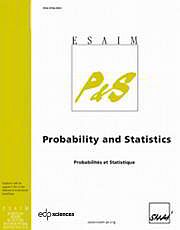Article contents
Uniqueness of invariant product measures for elliptic infinite dimensional diffusions and particle spin systems
Published online by Cambridge University Press: 15 November 2002
Abstract
Consider an infinite dimensional
diffusion process process on TZd, where
T is the circle, defined by the action of its generator
L on C2(TZd) local functions as
$Lf(\eta)=\sum_{i\in{\bf Z}^d}\left(\frac{1}{2}a_i
\frac{\partial^2 f}{\partial \eta_i^2}+b_i\frac{\partial f}{\partial
\eta_i}\right)$ . Assume that the coefficients, ai and bi are
smooth,
bounded, finite range with uniformly bounded second order
partial derivatives, that ai is only a function of $\eta_i$
. Assume that the coefficients, ai and bi are
smooth,
bounded, finite range with uniformly bounded second order
partial derivatives, that ai is only a function of $\eta_i$ and that $\inf_{i,\eta}a_i(\eta)>0$
and that $\inf_{i,\eta}a_i(\eta)>0$ .
Suppose ν is an invariant product measure. Then,
if ν is the Lebesgue measure or if d=1,2, it is the
unique invariant measure. Furthermore, if ν is
translation invariant, then it is the unique invariant, translation
invariant measure. Now, consider an infinite particle
spin system, with state space {0,1}Zd, defined
by the action of its generator on local functions f by
$Lf(\eta)=\sum_{x\in{\bf Z}^d}c(x,\eta)(f(\eta^x)-f(\eta))$
.
Suppose ν is an invariant product measure. Then,
if ν is the Lebesgue measure or if d=1,2, it is the
unique invariant measure. Furthermore, if ν is
translation invariant, then it is the unique invariant, translation
invariant measure. Now, consider an infinite particle
spin system, with state space {0,1}Zd, defined
by the action of its generator on local functions f by
$Lf(\eta)=\sum_{x\in{\bf Z}^d}c(x,\eta)(f(\eta^x)-f(\eta))$ ,
where $\eta^x$
,
where $\eta^x$ is the configuration obtained from η
altering only the coordinate at site x. Assume that $c(x,\eta)$
is the configuration obtained from η
altering only the coordinate at site x. Assume that $c(x,\eta)$ are of finite range, bounded and that $\inf_{x,\eta}c(x,\eta)>0$
are of finite range, bounded and that $\inf_{x,\eta}c(x,\eta)>0$ .
Then, if ν is an invariant product measure for this process,
ν is unique when d=1,2. Furthermore, if ν is translation
invariant, it is the unique invariant, translation invariant
measure. The proofs of these results show how elementary
methods can give interesting information for general processes.
.
Then, if ν is an invariant product measure for this process,
ν is unique when d=1,2. Furthermore, if ν is translation
invariant, it is the unique invariant, translation invariant
measure. The proofs of these results show how elementary
methods can give interesting information for general processes.
- Type
- Research Article
- Information
- Copyright
- © EDP Sciences, SMAI, 2002
References
- 2
- Cited by


